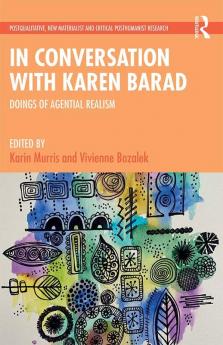English
Paperback
₹3450
₹4976
30.67% OFF
(All inclusive*)
Delivery Options
Please enter pincode to check delivery time.
*COD & Shipping Charges may apply on certain items.
Review final details at checkout.
Looking to place a bulk order? SUBMIT DETAILS
About The Book
Description
Author(s)
Shoutouts
<p><em>In Conversation with Karen Barad: Doings of Agential Realism</em> is an accessible introduction to Karen Barad’s agential realist philosophy. The authors take on a unique approach to involve the readers in in/formal conversations between Karen postgraduate and other researchers at a research event held in 2017 at Cape Town South Africa.</p><p>It features chapters that have been contributed by seminar delegates and organisers which put forth the continuing impact that Karen Barad has had on their empirical work research writing and drawing practices. The text further discusses the ethical and political significance of Karen’s work especially in the context of de/colonizing South African higher education. The chapters offer a series of worked posthumanist pedagogical examples and describe how a research seminar was organised differently and more in line with Baradian radical philosophy. At its heart this book makes a methodological and pedagogical contribution to the surge in literature on agential realism whilst simultaneously challenging dominant research binaries and arguing for a more egalitarian way of working together in knowledge-creation by troubling human and more-than-human hierarchies. The book’s uniqueness is further fortified through its description of in/formal conversations which are diffracted through chapters a doing of agential realism to reconfigure relationships between lecturer and student expert and novice supervisor and supervised researcher and research participants. These radical conversations are dis/continuing.</p><p>This book will be invaluable for students and individuals interested in advancing their understanding of agential realism and Karen Barad’s influence at large as well as students and scholars interested in postqualitative methods in all disciplines.</p>
Delivery Options
Please enter pincode to check delivery time.
*COD & Shipping Charges may apply on certain items.
Review final details at checkout.
Details
ISBN 13
9781032253831
Publication Date
-27-12-2022
Pages
-206
Weight
-300 grams
Dimensions
-156x234x11.18 mm











